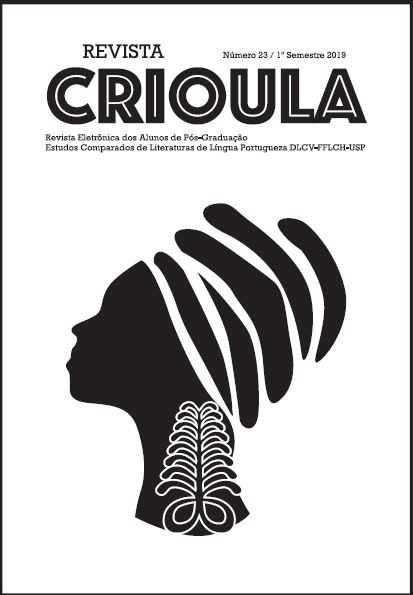Violence, criminalization and genocide in Capão Pecado
DOI:
https://doi.org/10.11606/issn.1981-7169.crioula.2019.156293Keywords:
Drug trafic, Genocide, Drug policy, Racism, Marginal literatureAbstract
In this paper, we analyze the novel Capão Pecado (2000), written by Ferréz, looking for the representation made of the negro and his inscription in novels that (re) think the favela and its problems, as drug policy. For this, at first, we discuss the differences between the literature on the black and the literature of the black, in the national context of eradication of black culture and marginalization of periphery, centralizing the process of updating the colonizing discourse and genocide of the poor and black population. Afterwards, we discuss the implications between legal discourse and social control, which institutionalize the punitive selectivity and genocide of the poor and black youth, while we properly analyze in the novel. In conclusion, we understand that this literary work shows that the war on drugs has translated into a war on the poor and, over the years, has turned into black genocide.
Downloads
References
COSTA, Breno; CHAVES, Reinaldo; POTTER, Hyury. O lucrativo exército de segurança privada comandado por militares, milicianos e amigos de Eduardo Cunha. Disponível em < https://theintercept.com/2018/07/16/o-lucrativo-exercito-de-seguranca-privada-comandado-por-militares-milicianos-e-amigos-de-eduardo-cunha-no-rio/ >. Acesso em 26 de Jul. de 2018
DALCASTAGNÈ, Regina. A auto representação de grupos marginalizados: tensões e estratégias na narrativa contemporânea. Disponível em < http://revistaseletronicas.pucrs.br/ojs/index.php/fale/article/viewFile/4110/3112 >. Acesso em: 13 de Jul. de 2018.
FERRÉZ. Capão Pecado. São Paulo: Labortexto, 2000.
GOTO, Mattheus. Anvisa libera uso de agrotóxicos que podem causar danos graves ao sistema nervoso. Disponível em: < http://thegreenestpost.com/anvisa-libera-o-uso-de-agrotoxico-que-pode-causar-danos-graves-ao-sistema-nervoso/>. Acesso em 15 jul. 2018.
GRACIANO, Mateus. Cidade de Deus História Real – o que há por trás da origem da CDD. Disponível em <https://www.matheusgraciano.com.br/cidade-de-deus-historia-real-a-parte/>. Acesso em: 15 de Dez de 2018.
NASCIMENTO, Érica Peçanha. Literatura Marginal: os escritores da periferia entram em cena. 2006. Dissertação (Mestrado em Antropologia Social) – Universidade de São Paulo, São Paulo.
PROENÇA FILHO, D. A trajetória do negro na literatura brasileira. Disponível em < http://www.scielo.br/scielo.php?script=sci_arttext&pid=S0103-40142004000100017> Acesso em 16 jul. 2018.
SAID, E. Cultura e imperialismo. Disponível em: < http://dynamicon.com.br/wp-content/uploads/2017/02/Cultura-e-Imperialismo-de-Edward-Said.pdf >. Acesso em: 15 de Jul. de 2018.
ZACCONE, Orlando. Acionistas do nada: quem são os traficantes de droga. Rio de Janeiro: Revan, 2007.
ZAFFARONI, E; BATISTA, N. Direito penal brasileiro. Rio de Janeiro: Revan, 2003.
ZALUAR, Alba; FREITAS, Luiz Alberto Pinheiro. Cidade de Deus: A história de Ailton Batata, o sobrevivente. Rio de Janeiro: FGV, 2017.


